Frontpage News (3259)
 President Muhammadu Buhari will be among African leaders and heads of state attending the International Conference on Africa’s Fight Against Ebola, holding in Malabo, Equatorial Guinea from 20 to 21 July, 2015. The theme of the conference, which is being organized under the auspices of the African Union Commission, is “Africa Helping Africans in Reconstructionand Recovery from Ebola.”. President Buhari who is scheduled to address the gathering, will be represented by Mr. Linus Awute, PermanentSecretary of the Federal Ministry of Health.
President Muhammadu Buhari will be among African leaders and heads of state attending the International Conference on Africa’s Fight Against Ebola, holding in Malabo, Equatorial Guinea from 20 to 21 July, 2015. The theme of the conference, which is being organized under the auspices of the African Union Commission, is “Africa Helping Africans in Reconstructionand Recovery from Ebola.”. President Buhari who is scheduled to address the gathering, will be represented by Mr. Linus Awute, PermanentSecretary of the Federal Ministry of Health.
The conference will bring together heads of government, ministers, experts, captains of industry and stakeholders who will share experiences of their Ebola Virus Disease (EVD) containment and support efforts. A major objective of the confab is to seek support for post-Ebola recovery and reconstruction in the region, especially for those countries that have been adversely affected by the disease.
Health insurance: FG to encourage access through loans
Written by Super UserThe Federal Government is considering the idea of making loans available to Nigerians to enable them access the health insurance scheme under the National Health Insurance Scheme programme. If the arrangement being put in place succeeds, money would no longer be a problem to accessing health care facility in the country.
Acting Executive Secretary of the NHIS, Dr. Abdulrahman Sambo, disclosed this on Wednesday in Abuja when he received the report on the Hospital Capital Improvement Project committee. The report is expected to be presented at the Federal Executive Council for ratification.
Babatunde Fashola Lagos State Gov. signs compulsorily health insurance bill for every Lagosian
Written by Super User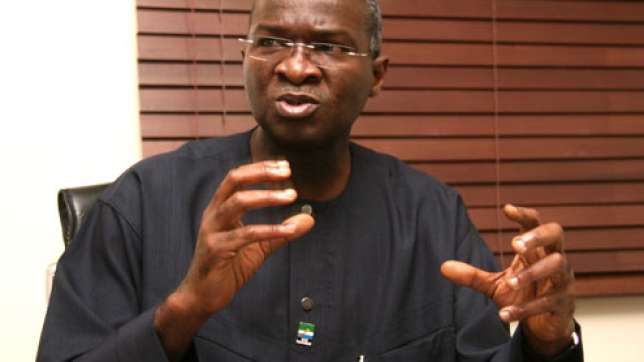 The bill is pro-poor in nature recognising that the poor and vulnerable will need to have subsidised premiums from the state government.
The bill is pro-poor in nature recognising that the poor and vulnerable will need to have subsidised premiums from the state government.
It's a new dawn for health care in Lagos state as Governor Babatunde Fashola has signed into law the Lagos State Health Management Agency Bill, which will mandate Lagosians to have compulsory health insurance. According to Business Day, the bill is pro-poor in nature recognising that the poor and vulnerable will need to have subsidised premiums from the state government.
Speaking on the bill, Fashola said: “For those who cannot afford the scheme Lagos State is not saying there is no free health anymore, but we know that there are things that are covered under the free health like malaria treatment and antenatal. For those things that are not covered by the health scheme and cannot be afforded by the less privileged, it will be paid for.”
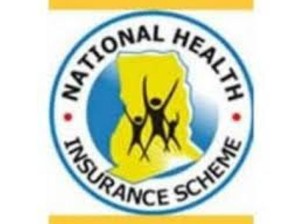 In furtherance of its mandate to deepen the penetration of health insurance in the country, as well and take the prospects of universal health coverage forward for Nigeria, The National Health Insurance Scheme (NHIS) is intensifying its resolve to decentralize the operation of health insurance in the country. In furtherance of its mandate,the Scheme has initiated a series of advocacy visits to state governors across the country to secure their understanding and cooperation regarding their roles in the new order. This was contained in a statement made available to LEADERSHIP yesterday in Abuja by the Head, Media & PR Division of NHIS, Ayo Osinlu.
In furtherance of its mandate to deepen the penetration of health insurance in the country, as well and take the prospects of universal health coverage forward for Nigeria, The National Health Insurance Scheme (NHIS) is intensifying its resolve to decentralize the operation of health insurance in the country. In furtherance of its mandate,the Scheme has initiated a series of advocacy visits to state governors across the country to secure their understanding and cooperation regarding their roles in the new order. This was contained in a statement made available to LEADERSHIP yesterday in Abuja by the Head, Media & PR Division of NHIS, Ayo Osinlu.
It said the first port of call in this nationwide advocacy was the government house in Kaduna, where a high powered team of the Scheme met the leadership of the state recently. Speaking at the occasion, the Ag. Executive Secretary of the Scheme, Mr Olufemi Akingbade stated that NHIS was inspired to make Kaduna its first target, in view of the pragmatic nature of the governor of the state, Mallam Nasir El Rufai, and the legacy of his impressive efforts to promote health insurance for the people of the Federal Capital Territory during his tenure as minister of the territory.
 Recently, the Federal Government launched a five-year National Drug Control Master Plan (NDCMP) to provide an integrated and comprehensive roadmap for multi-sectoral interventions to address a wide array of drug related issues. The NDCMP, which will be implemented between 2015 and 2019, aims to strengthen responses to drugs in order for it to contribute to the enhanced health, security and well-being of Nigerians.
Recently, the Federal Government launched a five-year National Drug Control Master Plan (NDCMP) to provide an integrated and comprehensive roadmap for multi-sectoral interventions to address a wide array of drug related issues. The NDCMP, which will be implemented between 2015 and 2019, aims to strengthen responses to drugs in order for it to contribute to the enhanced health, security and well-being of Nigerians.
The menace of illicit drug abuse is an age-long challenge in the country. Budgets have increased dramatically over the last two decades and drug-related prosecutions and incarcerations continue to make news, yet drug problems worsen: adolescent drug abuse is increasing, overdose deaths are at record levels, cannabis are grown in neighborhoods like flowers and are more accessible than before. Of particular note is the health problems related to drugs, especially the spread of HIV/AIDS, cancers, cardiovascular and respiratory diseases and other drug-induced antisocial behaviours.
Pharmaceutical Society of Nigeria (PSN) Borno Chapter Donates N13M to IDPs
 The Borno chapter of the Pharmaceutical Society of Nigeria (PSN) last weekend donated assorted drugs worth N13 million to Internally Displaced Persons (IDPs) to cushion their health demands.
The Borno chapter of the Pharmaceutical Society of Nigeria (PSN) last weekend donated assorted drugs worth N13 million to Internally Displaced Persons (IDPs) to cushion their health demands.
The Chairman of the association, Alhaji Zannah Bulama, made this known while presenting the items to the Deputy Governor of Borno, Alhaji Zannah Umar Mustapha, in Maiduguri. Bulama said that the gesture was to complement government efforts in alleviating the plight of the IDPs in the areas of accessing drugs for their health. “The drugs will go a long way in providing the immediate health needs of the IDPs in camps,” he said.
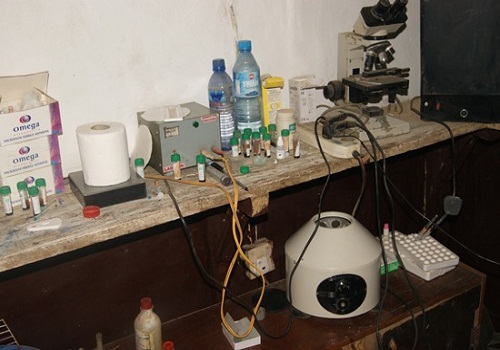 MLCSNA magistrate court (Court 1) in Agbor, Delta State has sentenced Mr Peter Chukwuemeka Okafor, a fake Med Lab Scientist to six months in prison without an option of fine for impersonating a Medical Laboratory Scientist, Mr Koru Kere Cletus. Okafor was arrested during one of the periodic inspection and monitoring exercise by Medical Laboratory Science Council of Nigeria South – South Zonal Office Benin, in conjunction with Association of Medical Laboratory Scientists of Nigeria (AMLSN) Delta State Branch, When the team approached one Mrs Patience Uti for verification of her documents, it was discovered that the 2012 practicing license presented by the addressee bearing the name Koru Kere Cletus was not the same as Peter Okafor that owns the laboratory under inspection.
MLCSNA magistrate court (Court 1) in Agbor, Delta State has sentenced Mr Peter Chukwuemeka Okafor, a fake Med Lab Scientist to six months in prison without an option of fine for impersonating a Medical Laboratory Scientist, Mr Koru Kere Cletus. Okafor was arrested during one of the periodic inspection and monitoring exercise by Medical Laboratory Science Council of Nigeria South – South Zonal Office Benin, in conjunction with Association of Medical Laboratory Scientists of Nigeria (AMLSN) Delta State Branch, When the team approached one Mrs Patience Uti for verification of her documents, it was discovered that the 2012 practicing license presented by the addressee bearing the name Koru Kere Cletus was not the same as Peter Okafor that owns the laboratory under inspection.
According to the council, besides the difference of names on the license, it was also discovered that it was signed by Mrs E. U Okonkwo who retired in 2010 making the authenticity questionable. While the accused was discharged and acquitted for lack of evidence on the 1st count charge, he was found culpable on the 2nd count charge of impersonating a Medical Laboratory Scientist, Mr Koru Kere Cletus. One of the Prosecution witnesses, Mrs Patience Uti had earlier told the court that she had known the accused as Mr Koru Kere Cletus for the past three years not knowing that his name is Mr Peter Okafor
Teaching hospital offers skeletal services amidst resident doctors strike
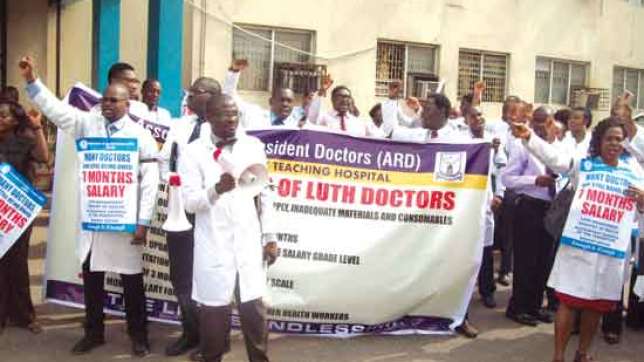 The Chief Medical Director (CMD) of LUTH, Prof. Chris Bode however said the hospital is open and attending to patients. Activities at the Lagos University Teaching Hospital (LUTH)have reportedly been paralysed following an indefinite strike embarked by resident doctors. The strike has lasted over 3 weeks now. According to The Guardian which visited the hospital, the atmosphere was dull, though other medical workers on ground were seen offering skeletal services. However, the Chief Medical Director (CMD) of LUTH, Prof. Chris Bode said the hospital is open and attending to patients.
The Chief Medical Director (CMD) of LUTH, Prof. Chris Bode however said the hospital is open and attending to patients. Activities at the Lagos University Teaching Hospital (LUTH)have reportedly been paralysed following an indefinite strike embarked by resident doctors. The strike has lasted over 3 weeks now. According to The Guardian which visited the hospital, the atmosphere was dull, though other medical workers on ground were seen offering skeletal services. However, the Chief Medical Director (CMD) of LUTH, Prof. Chris Bode said the hospital is open and attending to patients.
He added that all the essential units of the hospital such as X-ray, laboratories, labour wards services, and others have started working. "The emergency wards are open and doctors in all the essential services are working. We want members of the public to know that LUTH is not shut down, we are still rendering services” he said. Guardian however reports that some patients complained of sluggish attendance by doctors, while others said doctors are still attending to patients depending on the clinic the patient is visiting and based on appointment.
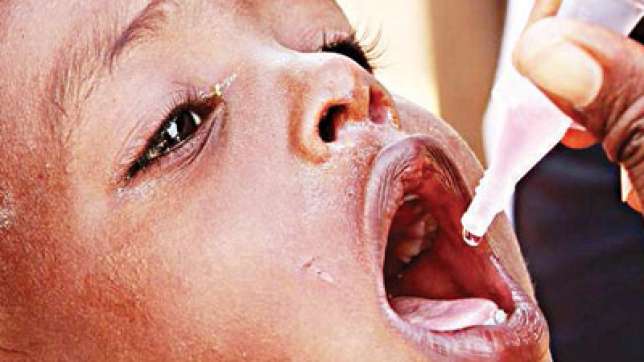 According to the World Health Organisation (WHO), the last case was in the Sumaila district of Kano state, one of only six in 2014. Nigeria has come one step closer to being polio free as today, Friday July 24th makes it one year since the last polio case was reported in the country. According to the World Health Organisation (WHO), the last case was in the Sumaila district of Kano state, one of only six in 2014. This a marked reduction from the 338 cases recorded in 2009. Nigeria will be removed from the WHO list of polio-endemic countries in 4 to 6 weeks if samples sent for checking are found clear and surveillance data meets international standards.
According to the World Health Organisation (WHO), the last case was in the Sumaila district of Kano state, one of only six in 2014. Nigeria has come one step closer to being polio free as today, Friday July 24th makes it one year since the last polio case was reported in the country. According to the World Health Organisation (WHO), the last case was in the Sumaila district of Kano state, one of only six in 2014. This a marked reduction from the 338 cases recorded in 2009. Nigeria will be removed from the WHO list of polio-endemic countries in 4 to 6 weeks if samples sent for checking are found clear and surveillance data meets international standards.
However health professionals and campaigners said the fight is not over and warned about complacency, with another 2 years to go before polio-free status is achieved. According to the executive director of the National Primary Healthcare Development Agency, Ado Muhammad, the main aim is total eradication of the disease. Meanwhile, several individuals and global charities like Rotary International and the Bill and Melinda Gates Foundation have called for both Nigeria and the international community to keep up the momentum.
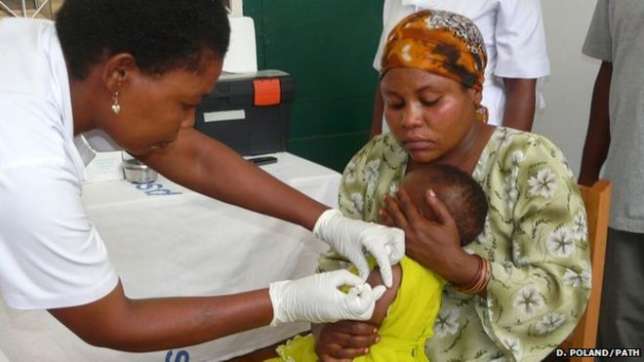 The vaccine, Mosquirix, otherwise known as the RTS,S vaccine, is the first against a parasitic infection in humans, and it was developed by GlaxoSmithKline. The world has come a step closer to fighting malaria as the first ever malaria vaccine has cleared one of the final hurdles prior to being approved for use in Africa. The European Medicines Agency gave a positive scientific opinion after assessing its safety and effectiveness. The vaccine, Mosquirix, otherwise known as the RTSS vaccine, is the first against a parasitic infection in humans, and it was developed by GlaxoSmithKline.
The vaccine, Mosquirix, otherwise known as the RTS,S vaccine, is the first against a parasitic infection in humans, and it was developed by GlaxoSmithKline. The world has come a step closer to fighting malaria as the first ever malaria vaccine has cleared one of the final hurdles prior to being approved for use in Africa. The European Medicines Agency gave a positive scientific opinion after assessing its safety and effectiveness. The vaccine, Mosquirix, otherwise known as the RTSS vaccine, is the first against a parasitic infection in humans, and it was developed by GlaxoSmithKline.
According to BBC, the World Health Organization will consider later this year whether to recommend it for children, among whom trials have yielded mixed results. GSK has not revealed the price of the vaccine, but has pledged not to make a profit from it. It has been designed specifically to combat malaria infection in children in Africa and will not be licensed for travellers. The vaccine works by triggering the immune system to defend against the first stages of infection by the Plasmodium falciparum parasite after it enters the bloodstream following a mosquito bite.
More...

The Nigerian health sector also suffered enough trauma from strike actions from other non- doctors staff under joint health union. These and many other reasons make Nigeria one of the worst countries for women and children to live with maternal death due to pregnancy and childbirth put at 1 in every 29 Nigerian women. This seriously threatens Nigerian ability to achieve Millennium Development Goals (4 and 5) of reducing infant mortality and improving maternal health.
HFN PARTICIPATES IN KWARA STATE HEALTH INSURANCE RESEARCH AND ADVOCACY DAY
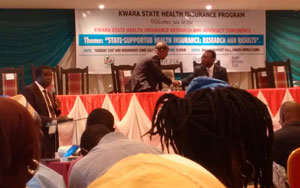 The HFN, in line with its cardinal goals of a better private healthcare sector, currently participated in the Kwara State Health Insurance Research and Advocacy Day in the ancient capital, Ilorin. The objective is to gather experts from the private sector, academia, government, non-government organizations and donors as well as local communities to discuss and research the lessons learned from the Kwara State Health Insurance Program and the implications for delivery of quality healthcare in Nigeria.
The HFN, in line with its cardinal goals of a better private healthcare sector, currently participated in the Kwara State Health Insurance Research and Advocacy Day in the ancient capital, Ilorin. The objective is to gather experts from the private sector, academia, government, non-government organizations and donors as well as local communities to discuss and research the lessons learned from the Kwara State Health Insurance Program and the implications for delivery of quality healthcare in Nigeria.
The Kwara State Health Insurance is a public-private partnership between the Government of Kwara State, Hygeia HMO, Health Insurance Fund, and the PharmAccess. As a result, the UN Secretary-General Mr Ban Ki-Moon has described it as groundbreaking and innovative. In 2014, the initiative was recognized by the OECD Development Assistance Committee for Taking Development Innovation to Scale. One unique feature of the Program is its research component to continuously measure its impact, the cost-effectiveness of maternal health care and other important attributes of the program. This has resulted in more than 50 peer-reviewed publications.
 Malaria is a topical concern in Nigeria. It is one of the two countries that together account for nearly half of the global malaria burden. Vulnerable groups such as under-5 – 300,000 die annually according to the Malaria Programme for States - and pregnant women are usually its victims with costs to the economy amounting to N480 billion in losses annually.
Malaria is a topical concern in Nigeria. It is one of the two countries that together account for nearly half of the global malaria burden. Vulnerable groups such as under-5 – 300,000 die annually according to the Malaria Programme for States - and pregnant women are usually its victims with costs to the economy amounting to N480 billion in losses annually.
As a result, on the 23rd and 24th July, the Grand Ball Room of the Intercontinental Hotel paid host to healthcare professionals, development experts, health economists, social sector workers and many other health-related people to the Annual Technical Forum of the Corporate Alliance on Malaria in Africa (CAMA) 2015. This was tagged “Mobilizing the Private Sector in the Fight against Malaria”, a reflection of the current line of thought in health discourse in the nation.
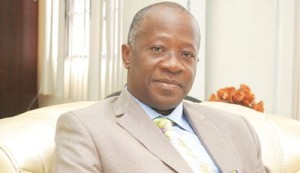 Prof. Abdulganiyu Ambali, the Vice-Chancellor of University of Ilorin (Unilorin), says the institution’s Ebola Research Committee is working toward developing a vaccine for the Ebola virus. Ambali, who disclosed this in an interview with the News Agency of Nigeria (NAN) on Sunday in Abuja, said that the process of developing a vaccine was a long one. “What is happening is that the committee is just monitoring events; in terms of the vaccine, it will take a while because there are processes that you have to follow before you develop a vaccine.
Prof. Abdulganiyu Ambali, the Vice-Chancellor of University of Ilorin (Unilorin), says the institution’s Ebola Research Committee is working toward developing a vaccine for the Ebola virus. Ambali, who disclosed this in an interview with the News Agency of Nigeria (NAN) on Sunday in Abuja, said that the process of developing a vaccine was a long one. “What is happening is that the committee is just monitoring events; in terms of the vaccine, it will take a while because there are processes that you have to follow before you develop a vaccine.
“For example, you have to isolate the virus; grow the virus; attenuate the virus; bring it out for testing; and then before the final usage. “So those are the processes that any vaccine candidate will have to pass through before you can now use on victim. “But right now what they are doing is monitoring events across the borders; and then we have put in place the facilities to be able to advise our staff as well as students that want to visit those places (High risk Ebola countries).






